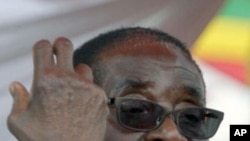The first independent review of the often turbulent and sometimes violent politics of Zimbabwe’s two-year-old inclusive government indicates there has been some progress and positive change.
The report by the Solidarity Peace Trust says continued control of the security sector by President Robert Mugabe’s ZANU-PF party has allowed for episodes of intense political turmoil since the inclusive government came to power.
But the report, entitled "The Hard Road to Reform," also notes that ZANU-PF has been constrained by the so-called Global Political Agreement, or GPA. The agreement was negotiated and underwritten by the Southern African Development Community, or SADC, which brought about the unity government.
The primary goal of the agreement was to create a stable economic and political environment in which free and fair elections can be held before March 2013, five years after the last elections narrowly won by the Movement for Democratic Change, MDC.
The unity government consists of ZANU-PF party, the main MDC faction led by Prime Minister Morgan Tsvangirai and the smaller MDC party.
Solidarity Peace Trust says that political violence spiked significantly after Mugabe said late last year he was uncomfortable in a unity government, and his party committed itself to fresh elections at its annual conference last December.
Attacks against the MDC and arrests of its members, including legislators and a cabinet minister increased, as did anti-MDC propaganda in the ZANU-PF controlled national media. Most of these incidents, about 75 percent, occured in the capital, Harare, where the MDC has its headquarters.
But Solidarity Peace Trust director, Brian Raftopoulos says that even so, there are fewer such incidents than before the inclusive government, and that there is a measure of political and economic stability. "It is important to note that deplorable as the violence has been, it is significantly less than at this time in 2008," Raftopoulos stated.
Raftopoulos says political violence marked most elections in Zimbabwe since 2000 when the MDC became the first political party since independence in 1980 to nearly beat ZANU-PF. But he says, memories of political violence run deep. "The opinion of this report on what is currently taking place in Zimbabwe might be called matchbox rattling. If in 2002 your house was broken down, and in 2008 your neighbor's house was burned down, then in 2011 the local war veterans only have to stand in the village and rattle the matchbox to invoke very high levels of fear and anxiety in the whole village," he said.
He said there was intense political struggle for control of the state between ZANU-PF and MDC, and that ZANU-PF blocks the road to reform.
Nevertheless, Raftopoulos said, the Global Political Agreement, for all its ambiguities, laid down some rules, or markers, against which ZANU-PF is now measured.
"There have been markers of ZANU-PF's obstruction strategy and that has been important in building up a case within the GPA of ZANU-PF's undemocratic politics and undemocratic structures," Raftopoulos said.
Since the inclusive government was sworn in to implement reforms spelled out in the GPA, Mugabe and MDC leader Tsvangirai regularly report to the Southern African Development Community.
Until last month, SADC was accused by many Zimbabweans of protecting Mugabe and ZANU-PF, and for not insisting that the political agreement be fully implemented ahead of any fresh elections.
At a meeting in Zambia last month of the SADC Organ on Politics, Defence and Security, South African President Jacob Zuma accused ZANU-PF and Mugabe of restricting political freedoms and causing political violence.
Raftopoulos says SADC had never before publicly criticized Mugabe and ZANU-PF.
"What changed of course in Livingstone was a very clear critical position towards ZANU-PF and an assertion that the implementation of the GPA had to be carried out in full. It was quite a clear criticism of Mugabe and his government,” Raftopoulos explained.
The Solidarity Peace Trust said the political landscape in Zimbabwe was also affected by credible reports that Mugabe’s health is declining. Mugabe is 87-years-old and has been four times to Asia for medical treatment since February.
Mugabe lost the 2008 first-round presidential poll to Tsvangirai, who then withdrew from the second round after hundreds of his supporters were killed. The MDC also narrowly beat ZANU-PF in the legislative elections.




